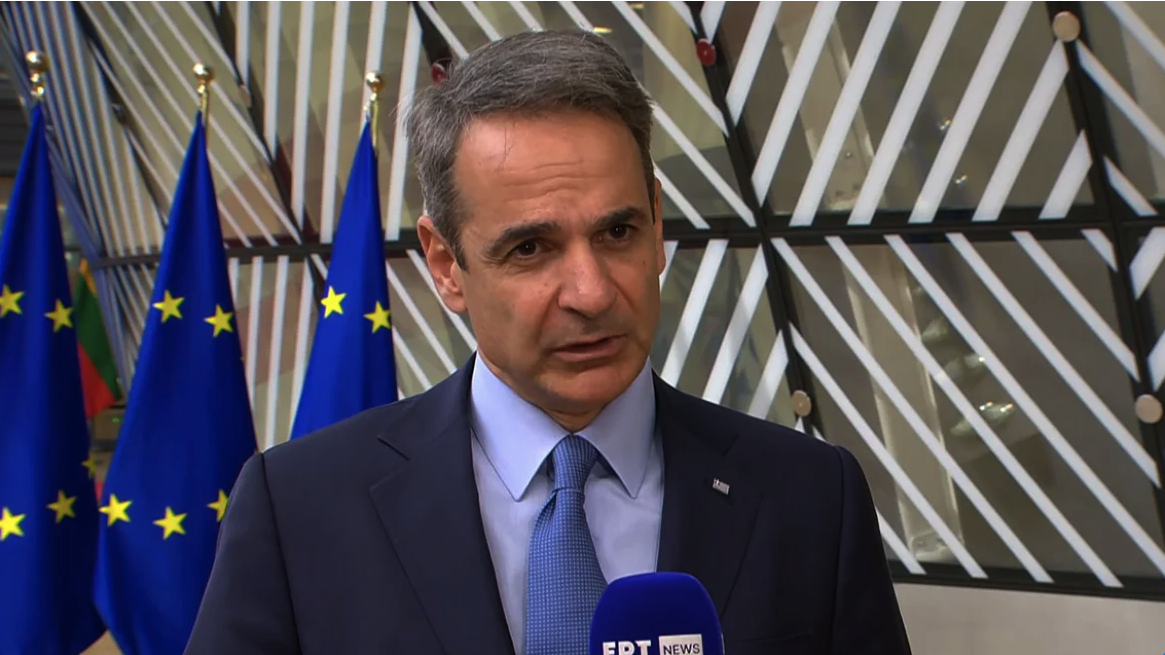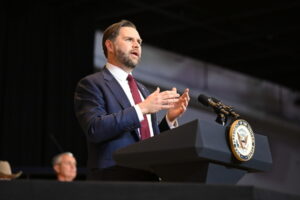Prime Minister Kyriakos Mitsotakis proposed the issuance of a Eurobond for the EU’s defence armouring, speaking at the Brussels EU Summit.
“Greece must remain shielded so it must look at new new ways to finance defence spending,” the prime minister said initially, arriving at the summit.
Watch video:
What will be discussed at the Summit
The military reinforcement of Ukraine together with the strengthening of European defence and security against the Russian threat, as well as the situation in the Middle East are the main issues to be discussed at the two-day summit in Brussels, which starts today at noon and will last until tomorrow, Friday.
As the war in Ukraine is at a “crucial moment”, as European Council President Charles Michel stresses in his letter to the European leaders, “our main task is the rapid provision of military assistance to Ukraine” and “the rapid supply and delivery of ammunition”.
European leaders will hold a teleconference with Ukrainian President Volodymyr Zelensky.
The European Council is expected to underline once again, according to the draft conclusions, the EU’s determination to continue to provide Ukraine and its people with all necessary political, economic, financial, humanitarian, military and diplomatic support “for as long and as intensively as needed”.
As US aid is still blocked in Congress, the EU has put several ideas on the table to strengthen Ukraine’s arsenal. One of these ideas is the use of Russian frozen asset returns.
These are the assets and reserves of the Central Bank of Russia that are frozen in the EU (about €210 billion). Depending on interest rates, the revenues generated by these frozen assets could generate about €3 billion per year for Ukraine.
This amount will be spent on equipping Ukraine and not on its reconstruction, as originally foreseen.
According to diplomatic sources, some neutral countries seem to be unhappy with this, but the majority of countries seem to support the proposal.
On defence and security, European leaders are expected to call for more to be done to strengthen the EU’s defence readiness.
“Now that we face the biggest security threat since the Second World War, it is time to take radical and concrete measures to be ready for defence and to put the EU economy on a war footing,” Charles Michel stresses in his letter to the “27”.
“The European defence technological and industrial base must be strengthened across the Union” and “increasing defence readiness and strengthening the Union’s sovereignty will require additional efforts”, European leaders are expected to stress, according to the draft summit conclusions.
Improved access to public and private funding for the European defence industry will also be called for.
In this context, the European Council is expected to call on the EU Council and the Commission “to explore all options for mobilising funding and report back by June.
The European Investment Bank is invited to adapt its lending policy to the defence industry and the current definition of dual-use goods, while preserving its financing capacity”.
Moreover, in order to strengthen the European defence industry, various ‘innovative ideas’ are being considered, such as the possibility of Eurobonds for defence, which, according to diplomatic sources, are supported by France and Italy and the southern countries in general, but not by the so-called ‘stingy’ northern countries, with Germany leading the way.
For this reason, in the draft conclusions, European leaders call for “all options” to be considered, rather than “innovative ideas”, ahead of the Commission’s report due in June, according to diplomatic sources.
On the situation in the Middle East and in particular in the Gaza Strip, where 70% of the population is at risk of starvation, EU heads of state and government are expected to call for an “immediate humanitarian pause leading to a sustainable ceasefire” in Gaza.
Due to their strong disagreements on this issue, the “27” had failed to address the Gaza issue at previous summits, but this time, according to diplomats, European leaders want a “balanced” text to be included in the summit conclusions.
Before the start of the summit, European leaders will meet with UN Secretary General Antonio Guterres, who will brief them on the situation in Gaza and the UN Relief and Works Agency for Palestine Refugees (UNRWA).
According to the draft conclusions, it will be noted that UNRWA’s services are “indispensable” as well as the financial support provided by the EU.
European leaders are expected to call for “full, rapid, safe and unhindered humanitarian access to and throughout the Gaza Strip through all routes”.
They are also expected to underline the need to create new land routes and crossing points, welcoming the opening of a sea route from Cyprus that “complements” land routes for the delivery of humanitarian aid.
The draft conclusions also noted that “immediate steps should be taken to prevent any further population displacement and to provide safe shelter for the population to ensure that civilians are protected at all times”.
The issue of enlargement will also be on the agenda of European leaders.
They will have to decide whether to open EU accession negotiations with Bosnia and Herzegovina, following the European Commission’s recommendation.
Trump: Putin “probably” involved in Navalny’s death
A majority of countries are in favour, but on condition that certain reforms are approved before these talks are formally launched, according to diplomatic sources.
Finally, European leaders will discuss the agricultural issue.
The European Commission has presented a legislative proposal to simplify certain rules of the Common Agricultural Policy.
The European Council conclusions are expected to focus on reducing administrative burdens and on the fair application of rules on imports.
The draft conclusions also mention the need for a fair treatment of the issue of autonomous trade measures for Ukraine.
The second day of the Summit, tomorrow, Friday 22 March, will start with the Euro Summit and will continue with the agenda items left open from the previous day.
The Euro Summit will be attended by European Central Bank President Christine Lagarde and the President of the Eurogroup.
The economic and financial situation and the continued close coordination and governance of macroeconomic policies will be discussed.
The discussion will focus on the need to deepen the Capital Markets Union.
Ask me anything
Explore related questions





